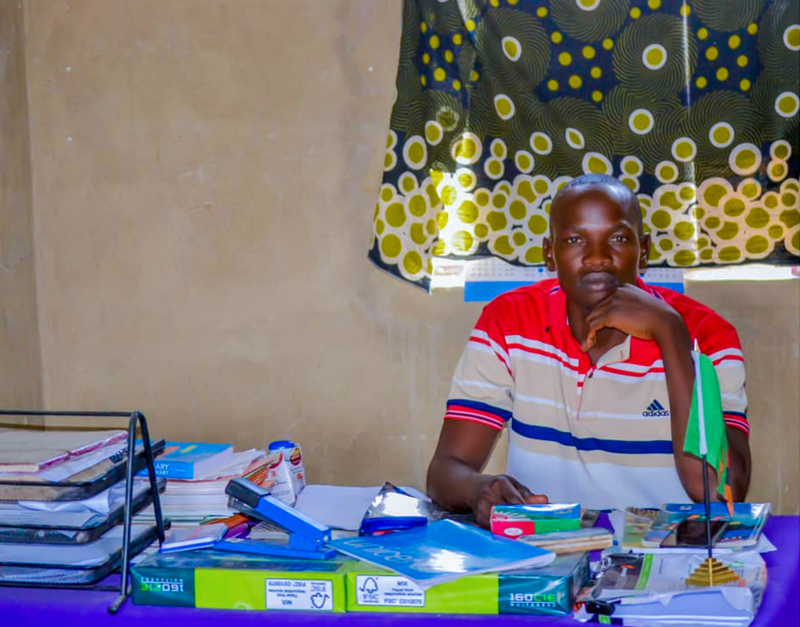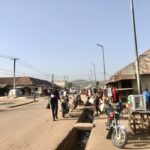By Oscar Mugabi Zulu
When the COVID-19 pandemic struck his rural community, Dalab Zimba, the headmaster of a local private school, knew that if his students did not pass the year, his school would fail as a business. So, he came up with extreme measures to keep his students learning.
Lacking the infrastructure for online learning, he became the network. Masked up and remaining outdoors, Zimba would visit his school’s students one by one, walking vast distances across the countryside in northeastern Zambia. At each student’s home, he would distribute teaching materials and ensure that the student was kept current.
“For government workers, they could stay home without teaching and still have a salary at the end of the month. So I was also thinking of my teachers and myself by continuing to teach students at their homes,” said the headmaster of Chachacha Primary School.
It may have been due to pure necessity, but the community has never forgotten the extreme lengths Zimba went to to educate their children. Today, Covid is just one of many obstacles that have stood in the way of the 28-year-old headmaster, whose few years belie a full and diverse journey in education.
From Volunteer to Leader
In the village where Zimba grew up, many eager learners and a shortage of teachers was an obvious problem. Encouraged by a mentor and determined to pursue a diploma in education, Zimba persuaded the community to sponsor his tertiary education through distance learning at Nkhrumah University.
The young man’s teaching journey commenced in 2015 when he served as a volunteer teacher at Chachacha Primary under the guidance of the school’s founder. When the founder was transferred to a school in the country’s Chipata District, she asked Zimba to continue her legacy.
“My journey was profoundly influenced by my mentor Oline Gwenzi and her husband Sunday Nketani. She gave me the opportunity to lead the school… The couple instilled hope and ignited my passion for education,” he explained.
Zimba took up the challenge and embarked on the tough task of transforming a school that had little to no infrastructure. He recruited volunteer teachers and soon the team was leading the school to victory in numerous zonal and district competitions.
An annual enrollment of 32 learners a year has mushroomed to 280, with the school providing a lifeline for many families as it is the closest school in the district. Though the private school operates as a business, many learners are subsidised.
“Parents of each learner pay 110 kwacha (about US$5.19) per school term. But you’ll find that nine children are coming from one household so if you multiply that 110 by 9, it’s too much for one household here,” Zimba explained.
Zimba’s vision extends well beyond the walls of the school. He sees innovation in education as essential to raising educational standards and building a dedicated teaching workforce that can deliver quality education and foster an educated citizenry.
To improve the school infrastructure, Zimba took up brickmaking for constructing new school buildings. Currently, the school has two blocks, each with three classrooms
Luckily, Chachacha is also set in a region of Zambia renowned for its fertile land. So, in addition to his educational endeavours, Zimba has become an avid farmer, using his agricultural pursuits to support the school – and his wife and two children. A flourishing garden and poultry operation contribute not only to his household income but also to the remuneration of the school’s teachers.
Expanding Educational Horizons: The Vision for a Comprehensive School
Looking to the future, Zimba dreams of expanding the school to offer education from pre-school to secondary level. He has engaged his area Member of Parliament, Misheck Nyambose who connected him with the Ward Development Committee for potential funding.
“I hope these funds will facilitate the construction of additional classrooms and teacher accommodation, ultimately motivating the teaching staff,” Zimba said.
Zimba added that while the resources have been meagre, his teachers appreciate that there is some compensation at the end of each month.

In addition, Chachacha Primary School has received funding from non-governmental organisations, like USAID.
“I want to extend my heartfelt gratitude to the Let’s Read Project for their invaluable support, providing materials, equipping us with tablets and equipping us with tablets, enabling us to gauge our performance through empirical evidence via standardised literacy assessments. Also, through unwavering determination, our school gained recognition from UNICEF, resulting in the provision of extra teaching and learning materials. These strides affirm our path towards progress,” he disclosed.
Throughout his journey, the surrounding communities of Chama town have rallied behind Zimba’s mission to develop the school. The community has actively supported school construction efforts by producing bricks and contributing to the school’s growth.
“My hope for Chachacha is to have a boarding school and to one day own a college to make it easier for the communities around to access school from reception to college,” Zimba concluded.
bird story agency
When the COVID-19 pandemic impacted his rural community, Dalab Zimba, headmaster of Chachacha Primary School in northeastern Zambia, took extraordinary measures to ensure his students continued learning. Without infrastructure for online education, Zimba personally visited students to distribute materials and maintain their studies. This dedication has made him a respected figure in the community.
Initially starting as a volunteer in 2015, Zimba's journey in education was inspired by his mentor. He transformed Chachacha Primary by recruiting volunteer teachers and improving infrastructure. Student enrollment grew from 32 to 280 annually, with many learners subsidized due to financial difficulties in their households.
Zimba's vision for the school extends beyond current operations; he aims to expand it from pre-school to secondary education. He has sought funding through local government and NGOs like USAID and has gained recognition from UNICEF for the school's progress.
In addition to his educational efforts, Zimba engages in farming to support his family and the school's finances. His ultimate goal is to establish a comprehensive education system, including a boarding school and a college, accessible to the local communities.






